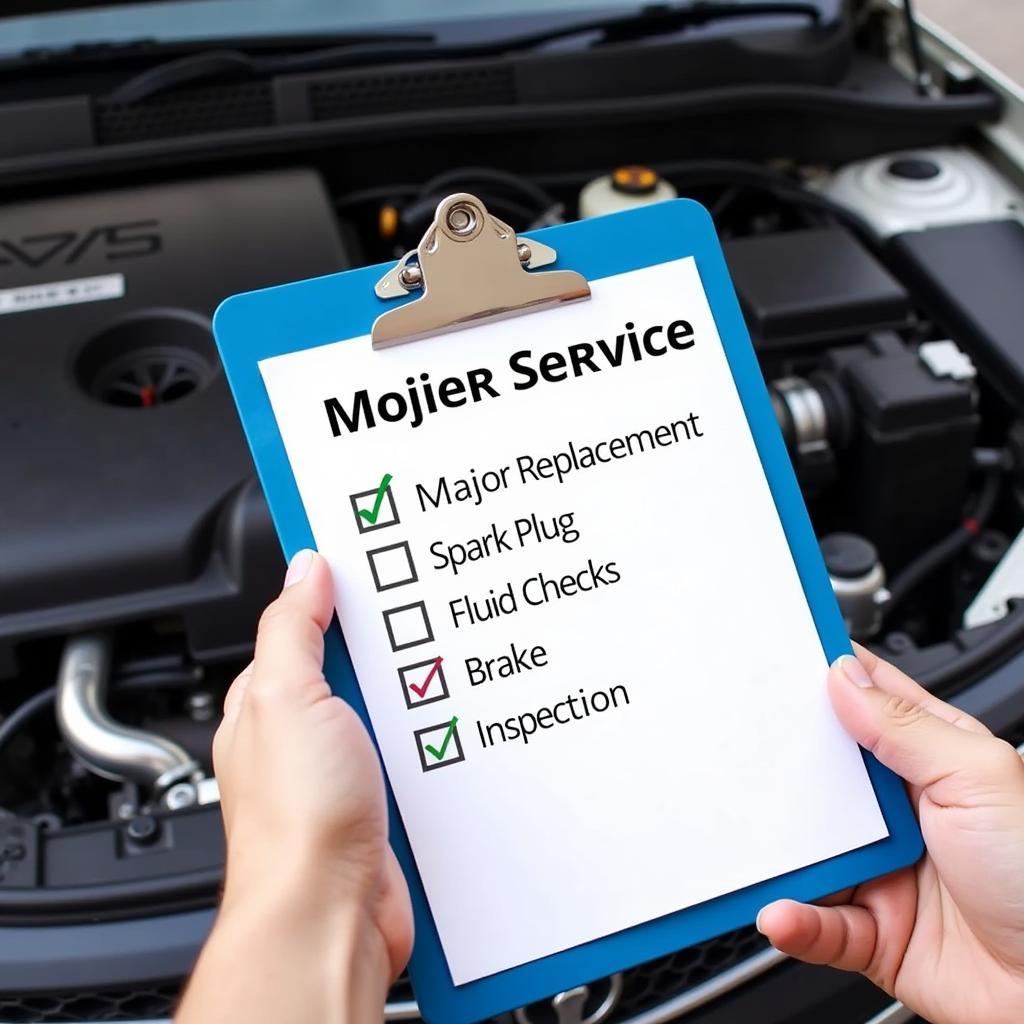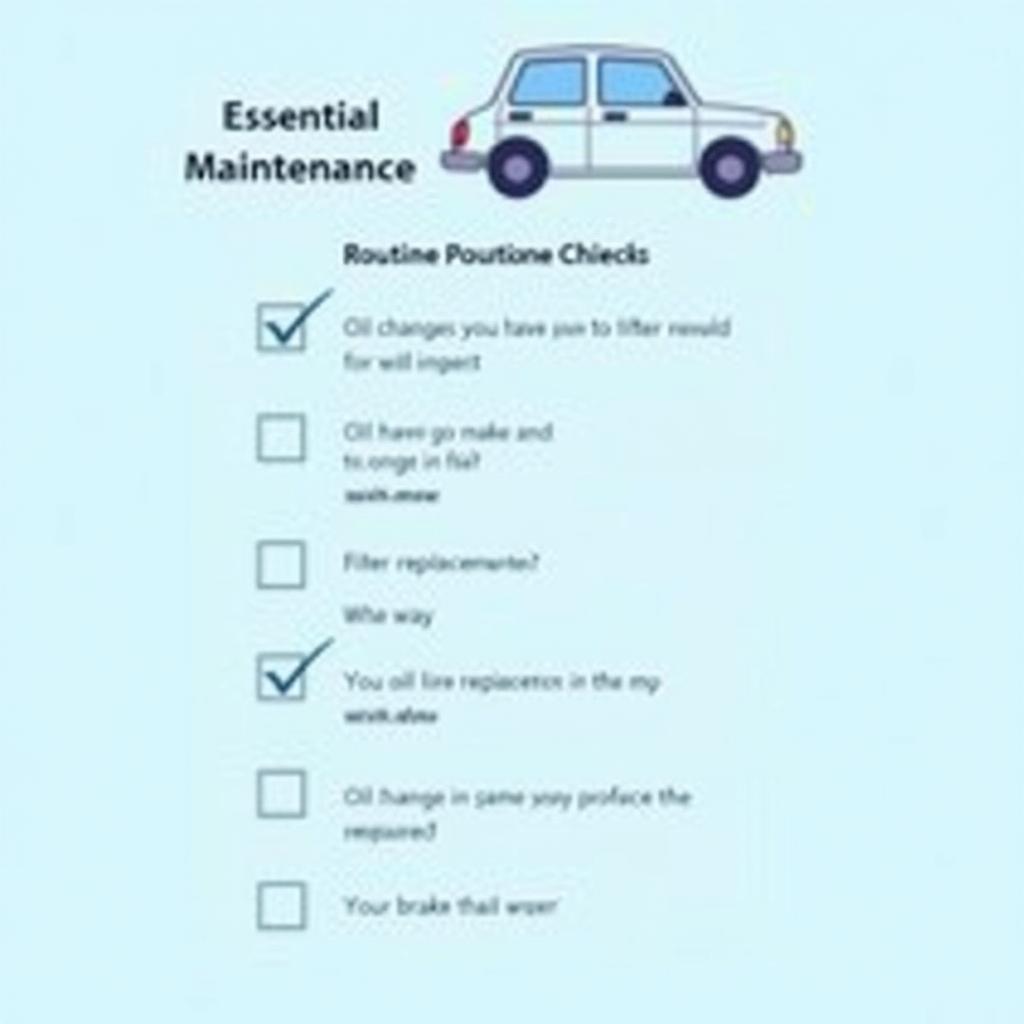When Does a Car Need a Major Service?
A car is a significant investment, and regular maintenance is crucial for its longevity and performance. Understanding when your car needs a major service can save you money in the long run and prevent unexpected breakdowns. But how do you know when that time is?
Many factors determine when a car requires a major service, going beyond just mileage. Let’s dive into the key indicators and help you keep your vehicle in top condition. If you are looking for more information on car servicing, you can check out how does car service work.
Understanding Your Car’s Service Schedule
Every car manufacturer provides a recommended service schedule in the owner’s manual. This schedule outlines the specific maintenance tasks required at different mileage intervals. These intervals are typically expressed in miles or kilometers and are categorized as minor and major services. Sticking to this schedule is the best way to proactively address potential issues before they become major problems.
Decoding the Service Intervals
Minor services usually involve routine checks like oil changes, filter replacements, and tire rotations. Major services, however, are more comprehensive and delve deeper into the vehicle’s vital systems. They typically occur at higher mileage intervals, such as every 30,000, 60,000, or 90,000 miles. These intervals can vary depending on the make and model of your car, as well as your driving habits.
 Major Car Service Checklist
Major Car Service Checklist
Signs Your Car Needs a Major Service Sooner
While adhering to the manufacturer’s schedule is essential, several signs indicate your car might need a major service sooner than anticipated. These signs often manifest as performance issues or unusual noises, and ignoring them could lead to more significant and costlier repairs down the road. If you are unsure about how car servicing works, it is helpful to find out more.
Performance Issues to Watch Out For
A decrease in fuel efficiency, sluggish acceleration, or rough idling are potential indicators of underlying problems requiring attention during a major service. Similarly, difficulty starting the car or unusual noises coming from the engine could signify the need for a thorough inspection and potential repairs.
Unusual Noises: A Warning Sign
Strange noises emanating from your car, such as grinding, squeaking, or knocking, should never be ignored. These sounds can often pinpoint specific issues within the vehicle’s systems, such as worn brake pads, failing wheel bearings, or problems with the suspension. Addressing these concerns promptly during a major service can prevent further damage and ensure your safety on the road.
 Car Making Unusual Noises
Car Making Unusual Noises
The Importance of Regular Major Services
Regular major services are vital not only for maintaining your car’s performance but also for ensuring its safety and longevity. These services allow mechanics to identify and address potential issues before they escalate into major problems, saving you money and preventing unexpected breakdowns. For those interested in future trends of car services, you may be interested in when can we expect cars as a service.
Extending the Lifespan of Your Vehicle
By adhering to a regular major service schedule, you can significantly extend the lifespan of your vehicle. These services ensure that all vital components are properly maintained and functioning optimally, preventing premature wear and tear.
Maintaining Safety on the Road
Major services play a crucial role in maintaining your car’s safety on the road. Thorough inspections of the braking system, suspension, and other critical components help identify potential safety hazards and ensure that your vehicle is in optimal driving condition.
“Regular maintenance is the key to a long and healthy life for your car,” says renowned automotive expert, Dr. Emily Carter, PhD in Mechanical Engineering. “A major service is like a comprehensive health check-up, ensuring that everything is working as it should and preventing future problems.”
Factors Influencing Service Intervals
Several factors can influence the frequency of major services. Driving conditions, such as frequent stop-and-go traffic or driving on rough terrain, can put additional stress on your vehicle’s components, requiring more frequent servicing. Similarly, extreme weather conditions can also impact service intervals. You can learn more about who does car air conditioning service.
Driving Conditions and Climate
Harsh driving conditions or extreme temperatures can accelerate wear and tear on various parts of your car, necessitating more frequent major services. For instance, driving in dusty environments can clog air filters more quickly, while extreme heat can strain the cooling system.
 Factors Affecting Car Service Intervals
Factors Affecting Car Service Intervals
Conclusion
Knowing when your car needs a major service is essential for its longevity, performance, and safety. By following the manufacturer’s recommended service schedule and paying attention to any warning signs, you can keep your car running smoothly for years to come. Regular major services are an investment that pays off in the long run by preventing costly repairs and ensuring a safe and enjoyable driving experience. Remember, adhering to a regular maintenance schedule is crucial for maintaining the value and performance of your vehicle. Learn more on a complete care support services or how often service diesel car.
FAQ
- What’s the difference between a major and minor service? A minor service covers basic maintenance like oil changes and filter replacements. A major service is more comprehensive, including checks on vital systems like brakes, suspension, and the engine.
- How often should I get a major service? Refer to your car’s owner’s manual for the manufacturer’s recommended service intervals.
- What are some signs my car needs a major service? Decreased fuel efficiency, unusual noises, and sluggish performance can indicate the need for a major service.
- Why are major services important? They help maintain your car’s performance, safety, and longevity.
- Can I perform a major service myself? Major services require specialized tools and expertise. It’s best to have them performed by a qualified mechanic.
- What happens during a major service? A major service involves a thorough inspection and maintenance of various systems, including the engine, brakes, suspension, and fluids.
- How much does a major service cost? The cost varies depending on the make and model of your car and the specific services required.
Common Scenarios and Questions
Scenario 1: My car is making a strange noise. This could indicate a variety of issues, from worn brake pads to problems with the suspension. A major service will help identify and address the problem.
Scenario 2: My car isn’t performing as well as it used to. Decreased fuel efficiency, sluggish acceleration, or rough idling can be signs of underlying issues that a major service can address.
Scenario 3: I’m not sure when my last major service was. Consult your car’s service records or contact a qualified mechanic for an inspection.
Further Resources
For more information on car maintenance, check out our articles on how often to service a diesel car and complete car care support services.
Contact Us
Need help? Contact us via WhatsApp: +1(641)206-8880, Email: [email protected] or visit us at 456 Oak Avenue, Miami, FL 33101, USA. We offer 24/7 customer support.

